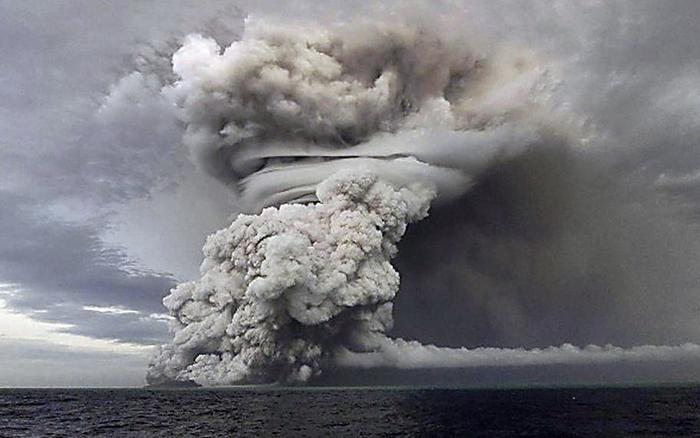New research from a collaborative team featuring Texas A&M University atmospheric scientist Dr. Andrew Dessler is exploring the climate impact of the 2022 Hunga Tonga volcano eruption and challenging existing assumptions about its effects in the process.

Credit: Tonga Geological Services / ZUMA Press / Zuma / RÉA (Courtesy of Dr. Mark Schoeberl)
New research from a collaborative team featuring Texas A&M University atmospheric scientist Dr. Andrew Dessler is exploring the climate impact of the 2022 Hunga Tonga volcano eruption and challenging existing assumptions about its effects in the process.
The remarkable two-day event, which occurred in mid-January 2022, injected vast amounts of volcanic aerosols and water vapor into the atmosphere. Historically, large volcanic eruptions like Tambora in 1815 and Mt. Pinatubo in 1991 have led to significant cooling effects on the global climate by blocking sunlight with their aerosols. However, Hunga Tonga’s eruption presented a unique scenario: As a submarine volcano, it introduced an unprecedented amount of water vapor into the stratosphere, increasing total stratospheric water content by about 10%.
Because water vapor is a powerful greenhouse gas, Dessler says there was initial speculation that it might account for the extreme global warmth in 2023 and 2024. Instead, the results of the team’s research, published Wednesday (July 24) in the Journal of Geophysical Research: Atmospheres, reveal the opposite: The eruption actually contributed to cooling the Earth, similar to other major volcanic events.
A Volcanic Eruption’s Cooling Effect
The team’s paper, titled “Evolution of the Climate Forcing During the Two Years after the Hunga Tonga-Hunga Ha’apai Eruption,” includes insight and analysis from Dessler, a professor in the Texas A&M Department of Atmospheric Sciences and the director of the Texas Center for Climate Studies; first author Dr. Mark Schoeberl, chief scientist at the Virginia-based Science and Technology Corporation in Hamburg, Virginia; and multiple scientists from the National Aeronautics and Space Administration (NASA).
Their methodology involved analyzing NASA and National Oceanic and Atmospheric Administration (NOAA) satellite data observations of aerosols and water vapor, among other variables, to estimate the energy balance of the Earth’s climate system. Their analysis revealed that the eruption resulted in more energy leaving the climate system than entering it, thereby inducing the slight cooling effect.
“Our paper pours cold water on the explanation that the eruption caused the extreme warmth of 2023 and 2024,” Dessler explained. “Instead, we need to focus primarily on greenhouse gases from human activities as the main cause of the warming, with a big assist from the ongoing El Nino.”
Implications And Future Research
According to Dessler, this research has important implications for both scientists and the general public. By dismissing the volcanic eruption as a major factor in the recent warming, the team’s study reinforces his point that human-induced greenhouse gas emissions are the primary driver of climate change. This focus is particularly relevant, given the ongoing debate and misinformation about the causes of global warming.
Moreover, Schoeberl says the study underscores the importance of continued investment in satellite-based stratospheric measurements.
“Our understanding of the Hunga Tonga eruption is largely thanks to the investment in stratospheric satellite measurements by NOAA and NASA over the past two decades,” Schoeberl added. “However, we need to be cautious about a potential ‘stratospheric data desert,’ as some of the most critical instruments are not being replaced.”
The Challenging Path Ahead
While this paper answers several important questions, Dessler acknowledges that it simultaneously introduces new ones. For instance, the researchers highlighted some unresolved issues related to the Hunga Tonga eruption, such as the unexpectedly low levels of sulfur dioxide produced by such a violent eruption and the minimal impact the eruption had on the 2023 ozone hole. The 2023 ozone hole refers to a significant thinning of the ozone layer over Antarctica, which allows more harmful UV radiation to reach the Earth’s surface. Additionally, the persistence of water vapor in the stratosphere beyond what was predicted by models suggests that there is still much to learn about stratospheric circulation processes.
As scientists work to resolve ongoing questions and deepen our understanding of the stratosphere, Schoeberl says the team’s work highlights the critical need for continued research and precise data to tackle the challenges of climate change.
By Grant Hawkins, Texas A&M University College of Arts and Sciences
###
Journal
Journal of Geophysical Research Atmospheres
Article Title
Evolution of the Climate Forcing During the Two Years After the Hunga Tonga-Hunga Ha’apai Eruption
Article Publication Date
24-Jul-2024



